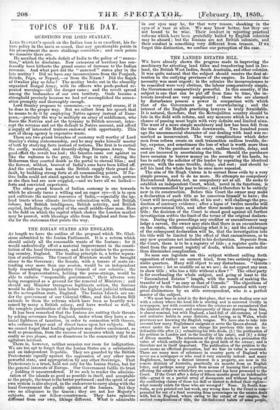TOPICS OF THE DAY.
QUESTIONS FOR LORD STANLEY.
Loan STANLEY'S speech on the Indian loan is so excellent, his fu- ture policy in the main so sound, that any questionable points in his presentment the more ehallenge correction ; and such points we conceive there are.
He ascribed the whole deficit of India to the policy of " annex- tion," which he disclaims. Now extension of territory has con- fessedly been hitherto the grand source of increase to the Indian revenue. And what part did the " annexed " states play in the late mutiny ? Did we have any inconvenience from the Punjanb, Scinde, Pegu, or Nepaul,—or from the Nizam ? Did the Rajah of Gwalior play us false F The mutiny broke out in the absurdly organized Bengal Army, with its officers who pooh-poohed re- peated warnings—till the danger came ; and the revolt spread among the budmashes of our own territory. Oude became a stronghold precisely because we had not accomplished the annex- ation promptly and thoroughly enough. Lord Stanley proposes to economise,—a very good course, if it be done in the proper way. But we collect from his speech that he means to do it by employing Native agency instead of Euro- pean,—precisely the way to multiply an army of middlemen, who fleece the Natives and set the tyranny to British account, inter-
' cept the revenue and set the default to Native account, and afford a supply,of' interested traitors endowed with opportunity. This sort of cheap agency is expensive waste. There are two grand branches of economy well worthy of Lord Stanley's rising statesmanship, and he may make himself master of both by studying facts instead of notions. The first is to curtail the costly, wasteful, and drearily-dying European Army. One good effect the revolt has had ; the fanatics came out against us like the vultures to the prey, like frogs in rain ; during the Mohurram they courted death as the portal to eternal bliss ; and the fiercest, wildest, bravest of India's sons have been killed off. And the outbreak has made the British supply their grand de- fault, by building strong forts at all commanding points. If Na- tive India could not stand against us before the war, such powers as she then had are now crippled,—and we have all we lacked— forts and convicted experience. The other grand branch of Indian economy is one towards which he already turns a willing and an eager eye—it is to open and cultivate the natural resources of India,—especially the up- land tracts whose climate invites colonization with, not British, labour but British intelligence, British activity, and British capital, including the capital of the small middle-class man. Here is the field on which the capital which chokes the London market may be poured, with blessings alike from England and from In- dia for the statesman that points the way.


























 Previous page
Previous page